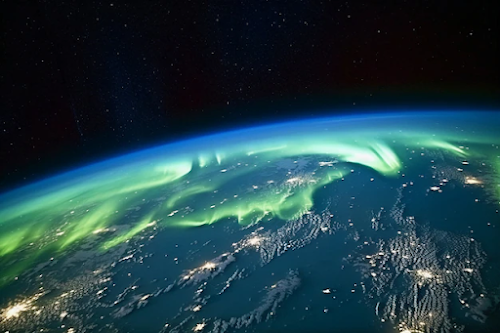The Longest Mountain Range: The Mid-Atlantic Ridge is the longest mountain range on Earth, stretching approximately 40,390 miles (65,000 kilometers) around the globe. It runs through the middle of the Atlantic Ocean and is formed by the tectonic plates slowly pulling apart.
Earthquakes Every Day: Earth experiences thousands of earthquakes each day, but most of them are too small to be felt by humans. Only a few of them cause noticeable shaking, and even fewer lead to significant damage.
The Innermost Core: Earth's inner core is solid, composed primarily of iron and nickel. Despite intense heat, the immense pressure at the core keeps it solid. The outer core, however, is in a liquid state.
Earth's Magnetic Field: Our planet has a protective magnetic field generated by the movement of the molten iron in the outer core.
This magnetic field helps shield the Earth from harmful solar radiation and cosmic rays. Ringing of the Earth: The Earth is constantly "ringing" like a bell, with vibrations caused by seismic events, ocean waves, and atmospheric disturbances. These vibrations can last for days.
Earth's Hidden Ocean: Scientists believe that deep beneath the Earth's surface, there may be a vast reservoir of water locked within the mineral structures of the mantle. This hidden ocean could hold several times more water than all the oceans on the Earth's surface combined.
The Moon's Influence: The Moon plays a crucial role in stabilizing the Earth's rotational axis. Without the Moon's presence, the planet's axial tilt would vary dramatically over time, leading to extreme climate changes.
Earth's Slowdown: The rotation of the Earth is gradually slowing down due to the gravitational interaction with the Moon. Consequently, days are getting slightly longer over millions of years.
Undiscovered Species: Despite extensive research, scientists believe that we have only discovered a small fraction of the species on Earth. The deep oceans and remote rainforests likely hide many undiscovered life forms. Earth's Age: The age of the Earth is estimated to be around 4.54 billion years. This estimation is based on the ages of meteorite samples and the oldest rocks on Earth.
These facts highlight the wonders and complexities of our planet. Earth continues to surprise and inspire scientists as we uncover more of its secrets through ongoing research and exploration.







0 Comments